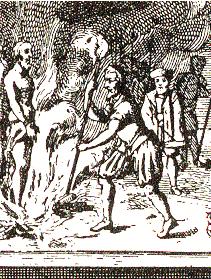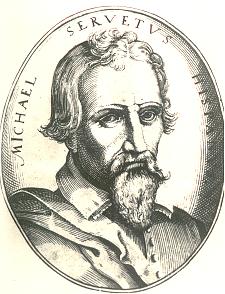Miguel Serveto grew up in Villanueva, Aragon. In his youth, the service of Granciscan monk, Juan Quintana, Servetus noted that the Doctrine of the Trinity was a hindrance to evangelizing Moors and Jews. Studying law at Toulouse Unversity in France, Servetus read the newly available Bible and was surprised to find the Trinity nowhere mentioned.
In 1529, Servetus returned to the service of Quintana, appointed confessor to Emperor Charles V, traveling to the Emperor's coronation in Bologna, Italy. Horrified by riches of the church, adoration of the Pope, worldliness of the priess, in 1530, Servetus left the Emperor's entourage, joining Protestants in Basel, Switzerland. After daily theological dispute, Servetus moved to more tolerant Strasburg, where, in 1531, he published De Trinitatis Erroribus (On the Errors of the Trinity), which aroused criticism, particularly from the Lutheran reformer, Melanchthon (x-y). A more conciliatory volume, Dialogorum de Trinitate (Dialogues on the Trinity), neither recanted nor quieted some of his rhetoric. His books were confiscated, and he was declared unwelcome in many Protestant towns
In 1532, the Supreme Council of the Inquisition in Spain began proceedings to summon him, or apprehend him. His brother, Juan, a priest, sought to bing Servetus to Spain for questioning. Terrified, he fled to Paris. assuming the name, Michel de Villeneuve.
Servetus studied mathematics and medicine at Parisian colleges, centers of religious ferment. Nicholas Cop, Rector of the University, fled the city after an inaugural address judged too Protestant. A young student of Servetus' acquaintance, John Calvin (who may have written the address, also fled into hiding. But, during the next year, Calvin risked return to Paris for theological disputations with Servetus, who failed to meet him.
Servetus supported himself in France as an editor, and wrote introductory notes for two editions of Ptolemy's Geography. Thus accredited, Servetus supplemented his income by lectures on geography. Next he prepared, in 1545, an edition of the Santes Pagnini's Bible , in seven volumes in 1545, anticipating modern Biblical criticism.
Inspired by medical works published by his firm, Servetus return to the study of medicine, 1536-38, at the University of Paris. He succeeded (later famed) Andreas Vesalius as assistant to Hans Gunther in dissection. Gunther wrote that "Michael Villonovanus" had a knowledge of the ancient works of Galen "second to none." But Servetus differed with Galen on pulmonary circulation. Galen said aeration of the blood occurred in the heart, assigning the lungs a minor function. By examining the wall of the heart and noting size of the pulmonary artery, Servetus decided that transformation of the blood, accomplished by release of waste gases and infusion of air, occurred in the lungs. Perhaps known by others, Servetus was the first to publish it as extensive ornamentation of his theological writing.
In 1538 Servetus, as Villeneuve, got into trouble with the faculty of medicine, the Parlement of Paris, and the Inquisition for mixing "astrology" with medicine -- actually a defense of Copernicus. Although acquitted by the Inquisition, the Parlement confiscated his published defense and ordered him to desist in "astrological" writings.
Servetus left Paris without a degree to practice medicine in Lyons, becoming personal physician of the Archbishop of Vienne.
During his twelve-year residence in Vienne, Doctor of Medicine, Michel de Villeneuve, Servetus prepared his major theological treatise, Christianismi Restitutio (The Restoration of Christianity). He began, in 1546, secret correspondence with John Calvin, now known as author of the famed Institutio Christianae Religionis (Institutions of Christian Religion) 1536, and pastor and chief reformer of Geneva. the most prestigious figure in the Reform branch of Protestantism.
 Spectators were amazed at Servetus' tenacity of faith. Burning at the stake, Servetus apparently
cried out, "O Jesus, Son of the Eternal God, have pity on me!" A witness of the execution wrote
that Servetus might have been saved had he called upon "Jesus, the Eternal Son."
A few months later Servetus was again executed, in effigy, by the Catholic Inquisition in France.
Spectators were amazed at Servetus' tenacity of faith. Burning at the stake, Servetus apparently
cried out, "O Jesus, Son of the Eternal God, have pity on me!" A witness of the execution wrote
that Servetus might have been saved had he called upon "Jesus, the Eternal Son."
A few months later Servetus was again executed, in effigy, by the Catholic Inquisition in France.

Many Protestants approved the Genevan sentence. Answering to critics, Calvin published, in 1554, a justification, Defensio orthodoxae fidei, contra prodigiosos errores Michaelis Serveti Hispani (Defense of Orthodox Faith against the Prodigious Errors of the Spaniard Michael Servetus).
Nearly all copies of Servetus' magnum opus, Christianismi Restitutio (which included the passage about circulation of blood in the lungs), were destroyed by the authorities. Only three copies have survived.